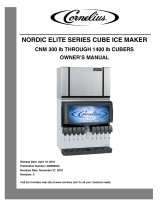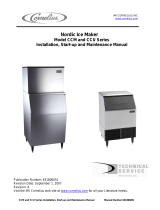
10
Cleaning
ICE Machine and/or Bin/Dispenser Cleaning and Sanitizing Instructions
Cleaning should be scheduled at a minimum of twice per year.
Sanitizing should be performed after each cleaning or more frequently as required.
Note: Electrical power will be ON when performing the following cleaning instructions.
Caution: Eye protection is recommended when handling descaler or sanitizer.
Wear protective rubber gloves when handling descaler or sanitizer.
The cleaning and sanitizing of any commercial ice machine are important procedures all operators need to
have in their preventive maintenance protocol. While similar, these two procedures are uniquely different and
accomplish different things. Cleaning or de-liming, dissolves the mineral deposits on the evaporator and
removes scale, calcium and other chemical buildup. Sanitizing disinfects the machine and removes microbial
growth including mold and slime.
In either case, it is important to use solutions that do not harm the ice machine. Never use cleaning or
sanitizing solutions that contain Nitric Acid, Sulfuric Acid, Hydrochloric Acid, Carbolic Acid, Acetic Acid, diluted
Acetic Acid or non-food-grade vinegar (concentration of acetic acid greater than 6% and does not contain
enzymes created in processing) or any chlorine-based solution such as bleach, chlorine dioxide or any type of
salts such as potassium chloride (potassium salts) or sodium chloride. Check the label or the manufacturer’s
Material Safety Data Sheet (MSDS) to be sure. These chemicals can attack the surface of the evaporator as
well as other metal components causing corrosion and flaking. Reverse Osmosis (RO) water can be very
acidic and can attack the evaporator and other metal in the ice machine. Because the RO process removes all
minerals and metals from the water it can promote the faster growth of microbial, mold and slime. If RO water
is used, Ice-O-Matic® recommends the water pH is verified to be a neutral 7.0 to minimize the corrosive
effects. Incorrect cleaners, sanitizers, and RO water that does not have a neutral pH could void the machine’s
warranty.
Cleaning/Descaling
Prior to Cleaning the ice machine and/or Bin/Dispenser, perform the following:
1. Remove the ice machine front panel.
2. Turn the machine “OFF” at the ON/OFF selector switch.
3. Remove all ice in the storage bin. (Required for cleaning and/or sanitizing)
Cleaning Instructions-Ice Machine
1. Remove the cover from the water reservoir and block up the float.
2. Drain the water reservoir and freezer assembly using the drain tube attached to the freezer water inlet.
Return the drain tube to its normal position and replace the end cap.
3. Add recommended amount of ice machine cleaner (diluted per manufacturer’s instructions) to the water
trough. (Reference cleaner Manufacturer’s instructions on the package)
4. Slowly pour the cleaning solution into the water reservoir until full. Wait 15 minutes, then switch the
ON/OFF switch to the ON position.
5. As the ice machine begins to use water from the reservoir, continue to add more cleaning solution to
maintain a full reservoir.
6. After all of the cleaning solution has been added to the reservoir, and the reservoir is nearly empty, switch
the ON/OFF switch to the OFF position.
7. Drain the water reservoir and freezing assembly using the drain tube attached to the to the freezer water
inlet. Return the drain tube to its normal position and replace the drain plug end cap. Wash and rinse the
water reservoir.
8. Sanitizing the Ice Machine is required after cleaning per Sanitizing Instructions




















